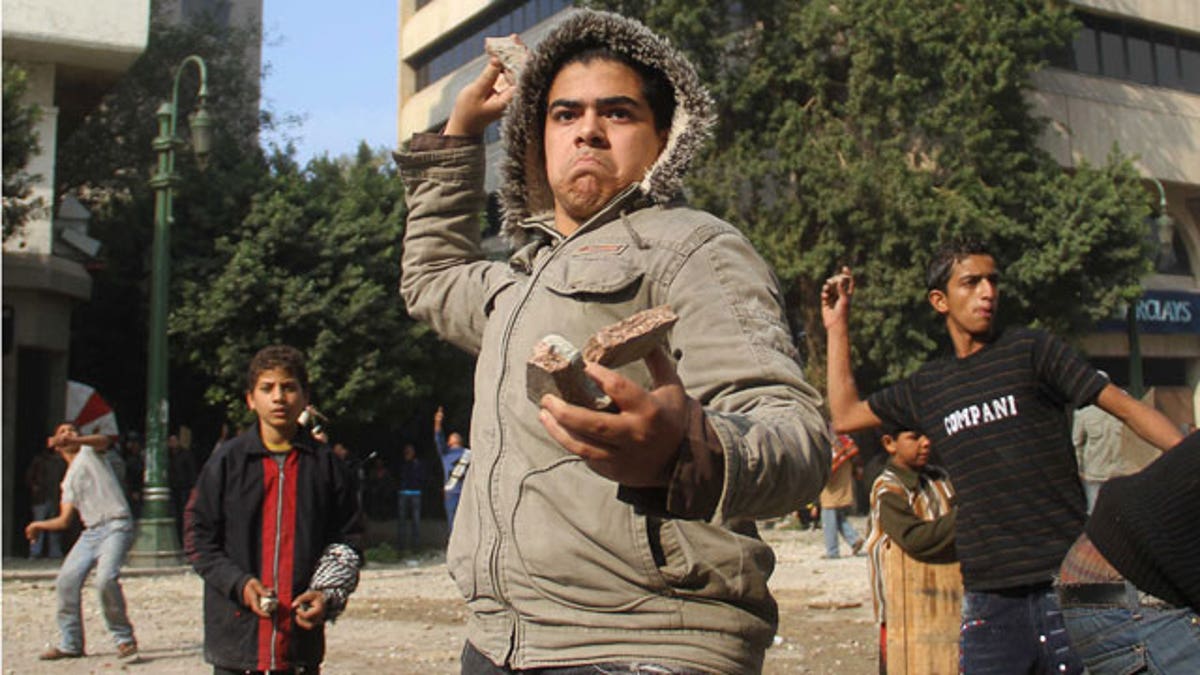
Dec. 16, 2011: Egyptian protesters throw rocks at military police during clashes near Cairo's downtown Tahrir Square, Egypt.
CAIRO -- Soldiers stormed a protest camp outside Egypt's Cabinet building, expelling demonstrators calling for an end to military rule, just as officials were counting votes Friday in the second round of Egypt's parliamentary elections.
The clashes underlined simmering tensions between activists and security officers and threatened to ignite a new round of violence after a mostly peaceful vote Wednesday and Thursday in an election considered the freest and fairest vote in the country's modern history.
Clashes erupted as demonstrators were camped out in front of the Cabinet building, demanding that the country's military rulers transfer power immediately to a civilian authority. The sit-in was in its third week.
One activist posted a photo online of a female protester beaten in the clashes, and others said they were briefly detained by military police. It was unclear how many protesters remain in military police custody.
On his Twitter account, leading reform figure and Nobel Peace Prize winner Mohamed ElBaradei condemned the violence.
"If the sit-in broke the law, isn't the cruelty and brutality used to break it up a greater violation of all human rights laws? This is not how nations are managed," he wrote.
The military took over after longtime President Hosni Mubarak was ousted in a popular revolt in February. Rights groups and activists charge that the military is carrying on the practices of the old regime, including arresting and beating dissidents.
Protesters at the Cabinet building said the clashes began Thursday evening after soldiers severely beat a young man who was taking part in the sit-in.
Hundreds of people rushed to join the protest after online video and photos showed people carrying the wounded man. The pictures showed his face and eyes bruised and swollen, his head wrapped in gauze and blood dripping from his nose.
Witnesses accused military police of snatching the man from near the sit-in and beating him inside parliament, near Cabinet headquarters. Then protesters threw rocks and firebombs at military police.
Activist Hussein Hammouda said the military responded by throwing rocks, pieces of glass and aiming water cannons from inside the gates of the nearby parliament building.
"Tensions between the people and security officers is so enflamed that anything that happens just blows up. There is no trust between the two sides," said Hammouda, who resigned from the police in 2005 to protest police practices.
Egypt's state news agency said at least four wounded people were taken to a nearby hospital and that a fire had broken out in a nearby government building as a result of the clashes.
State TV broadcast images of plainclothes security officers throwing rocks at protesters from the parliament building.
Protester Mostafa Sheshtawy said security forces burned protesters' tents overnight and ended the sit-in calling for an end to military rule. Dozens of people had been camped out in front of Cabinet headquarters following violence in Tahrir Square in late November, when more than 40 people were killed in clashes with security personnel.
Dissatisfied with the military's handling of Egypt's transition, protesters Friday chanted "Down with military rule" and "The people want the execution of the Field Marshal," referring to Defense Minister Hussein Tantawi, head of the military council.
Sheshtawy said dozens of protesters were being treated for their wounds Friday at a nearby field hospital.
"It's pretty ironic that the military is throwing rocks at protesters from the parliament building, where a sign is hanging that says democracy is the power of the people," Sheshtawy said.
The continued unrest since Mubarak's ouster has battered Egypt's economy, and many blame the protests for the instability. Friday's clashes overshadowed a nationwide campaign to urge Egyptians to buy locally-made goods.
Despite the protests, the military retains widespread support among many Egyptians who see it as the only entity able to run the country until presidential elections scheduled for next year.
Images of troops protecting polling centers and soldiers carrying the elderly to the polls have served to boost the military's image as guardians of the country.
